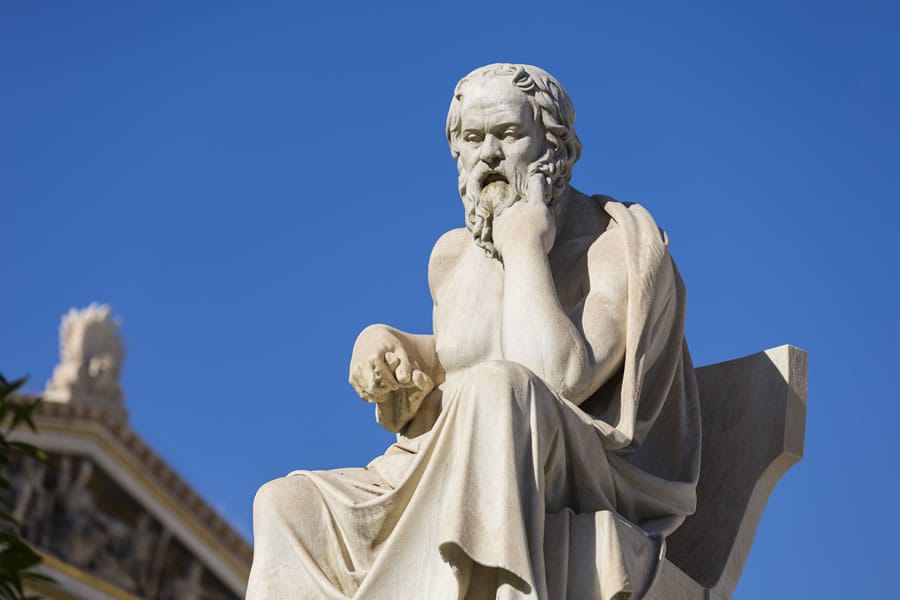
Socrates philosophy essay
Philosophy is very complex in its essence but it always aims at the revelation of truth. Therefore, philosophic studies become the permanent quest of truth. At this point, it is possible to refer to Socrates’ philosophy and his ideas, which make the search of truth as the main reason of purposeful and valuable life.
The primacy of the reasonable justice is, according to Socrates, crucial in determination of what is right against willful or arbitrary authority. The philosopher suggests looking for the truth as the crucial and determinant element of justice because to make justice means to find the truth. Otherwise, any decision would be unjust. At this point, it is possible to refer to his argument with Euthyphro concerning piety. Piety is a concept that implies the obedience to divine norms and rules and respect of gods. Socrates’ dialogue with Euthyphro reveals that this concept is extremely difficult to define. Euthyphro argues that he was inspired by deity to bring his own father to court (Fagan & Russon, 2009). Therefore, he believes his actions are pious, i.e. his actions manifest the respect to gods. In response, Socrates questions and doubts in stories concerning gods.
In such a way, Socrates challenges the essence of the argument of his opponent. Moreover, he steadily refers to examples concerning stories related to gods, which he believes to be inconsistent and incredible, whereas Euthyphro draws more and more examples of stories concerning gods, which he believes prove his position as being inspired by gods. However, eventually Socrates asks Euthyphro to define piety, which he fails to do because he cannot give the definition, which is universally true (Fagan & Russon, 2009). Thus, Socrates uncovers that the concept of piety offered by his opponent is incorrect.
The application of the reasonable method in search of justice is crucial since this methods helps to reveal accurately what is really just and what is not, while the application of other methods can make conclusions of the researcher biased, arbitrary and willful (Fagan & Russon, 2009). In other words, the distinct feature of the reasonable method in search of justice is its objectivity and reliance on facts that are processed and analyzed by a reasonable mind.
An unexamined life turns out to be too shallow for a reasonable person, like Socrates, since such a life is full of errors and misconceptions, which lead one to misleading outcomes and make one’s life fruitless since all one does in the course of an unexamined life, may be totally useless.
In fact, Socrates insisted that people should look for the true value of their life that was possible only with the help of careful examination and reasonable research of human life, its purposes and value.
Socrates stressed the importance of happiness, self achievement and fulfilling goals without hurting yourself or others. A person, who cannot find inner happiness or gain value, is living a life that is not worth living. Therefore, one should gain the value of life and inner happiness through studying and examining the life, the world around, and the internal world of him/her self. In such a way, the life became purposeful and fruitful. Otherwise, the life would be pointless and useless.
Socrates’ apology is the critique of the political life of the Athenian state. The philosopher was very skeptical about the vulnerability of political decisions and policies conducted by Athens. In fact, Socrates defends himself from accusations of the neglect and offense of religion and religious beliefs of Athenian citizens. At the same time, the standpoint of Socrates is philosophical in its essence. His primary goal is to present his views accurately and to prove that he is not innocent and, thus, to debunk the accusation. In this regard, he attempts to persuade the audience in his righteousness emphasizing the importance of the truth as his only goal. However, the philosopher rejects religion as the truth. Instead, he argues that he does believe in gods but he doubts in his abilities.
From philosophic standpoint, his position is reasonable and fair since he may doubt in virtually anything and, in search of truth, he should doubt in everything. However, from the political standpoint, such a position is unacceptable because Athenians were religious people and religion played an important part not only in the social but also political life of the Athenian society. Therefore, the position of challenging abilities of gods put under the question the essence of the ideology and religion dominating in the Athenian society.
Furthermore, Socrates questioned abilities of gods but such position was too daring for political leaders and political elite of Athens because if one dares to doubt in abilities of gods, who were always viewed in Athens as superior deities, then one would doubt in abilities of governors and the ruling elite at large. Therefore, if Socrates’ ideas became popular, there was the direct threat to the ruling regime in Athens, while the state was ruled by the aristocratic elite. In fact, people being influenced and inspired by ideas of Socrates could challenge abilities of the ruling elite and, thus, there was a risk of a coup-d’йtat and public turmoil to emerge.
Thus, Socrates reveals that the search of truth is the main point of human life and the life of a true philosopher.

